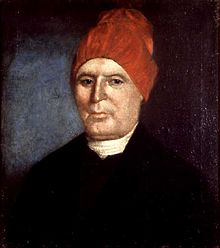Samuel Hopkins (1721–1803)
| Samuel Hopkins | |
|---|---|
 |
|
| Born |
September 17, 1721 Waterbury, Connecticut, British America (now Waterbury, Connecticut, U.S.) |
| Died | December 20, 1803 (aged 82) |
| Nationality | American |
| Occupation | Theologian, abolitionist |
Samuel Hopkins (September 17, 1721 – December 20, 1803) was an American Congregationalist theologian of the late colonial era of the United States, and from whom the Hopkinsian theology takes its name. He was also an opponent of slavery, saying that it was in the interest and duty of the U.S. to set free all of their slaves.
Samuel Hopkins (the younger) was born in Waterbury, Connecticut, and was named after his uncle, Samuel Hopkins (1693–1755), a minister in the church in West Springfield, Massachusetts. Hopkins graduated from Yale College in 1741, then studied divinity in Northampton, Massachusetts with Jonathan Edwards. He was licensed to preach in 1742, and in December 1743 was ordained pastor of the North Parish of Sheffield (now Great Barrington) in Housatonic, Massachusetts, a small settlement of only 30 families, from 1743 to 1769. Hopkins' theological views were faced with opposition and he was eventually dismissed from the pastorate due to a lack of funds for his support. From April 1770 until his death in 1803 Hopkins preached at the First Congregational Church in Newport, Rhode Island. While the British occupied Newport from 1776–1780, Hopkins preached at Newburyport, Massachusetts, Canterbury and Stamford, Connecticut.
Hopkins received a Doctor of Divinity from Yale in 1802.
He, Jonathan Edwards and Joseph Bellamy together created, perhaps unintentionally, the theological scheme that sometimes bears Hopkins name, i.e. Hopkinsianism, but is also known as the New Divinity, New School Theology, New England Theology or Edwardseanism. This religious system is a form of Calvinism which later adherents called "consistent Calvinism." The view evolved into a distinct theology which dominated theological thinking in New England, which was predominately Calvinist. The whole theological movement was important in the Second Great Awakening. It was opposed generally by the theologians of Princeton, including Charles Hodge. Hopkins is credited with originating the phrase "disinterested benevolence", though the concept is much older and can, for example, be seen in Jonathan Edwards ethical writings as well.
...
Wikipedia
